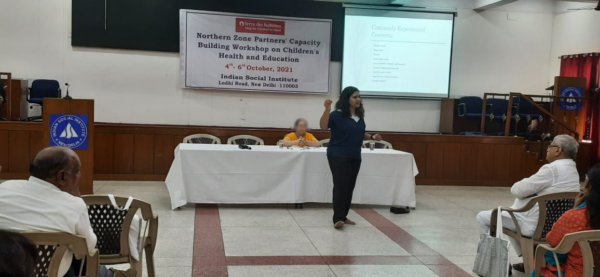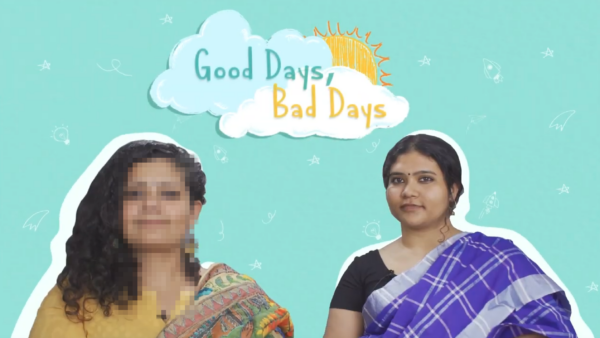Meet Maintainers Fellow Himani Kulkarni: Exploring the maintenance of mental health networks
– by Himani Kulkarni
Who am I?
My name is Himani Kulkarni and I am a Mental Health Professional, based in Delhi, India. I am honored to have been chosen as the Maintainer’s Public Health Fellow for the year 2023.
Being a psychotherapist, I have the privilege of working with individuals from diverse age groups, identities, and backgrounds. I delve into research that helps understand mental health needs, coping strategies, and mitigating factors in more detail and nuance. I also enjoy creating content sporadically that combines research-backed information and experiential knowledge in the area of mental health. My work is based on a trauma-informed, rights-based template of mental health. This means that I work with the belief that the traumatic and difficult experiences in our life shape our minds and bodies to respond in unlikely ways and that all of us deserve to have access to care and services that can help us repair those parts of ourselves.
How did it all start?
My journey in the field of mental health began with trying to understand why people behave the way they do. I grew up in a community with very intricate, and sometimes, confusing social rules that my young self struggled to decipher. This sparked my interest in trying to understand why those rules exist, and how they impact who we become as people. I could see, before I could verbalize, that social norms such as rigid gender roles, and socio-political determinants such as concerns about safety, and financial instability impacted people’s health and emotional well-being consistently. These experiences shaped my early interest in the field of mental health. Over the years, I got the opportunity to meet some competent and courageous colleagues and trainers who shaped these ideas further.

As a part of my work, I interned with an organization that operates from police stations and helps women in distress who find themselves unsure to pursue legal action against perpetrators but require assistance from social workers, and counselors. Working with hospitals, rehabilitation centers, and low-resource schools made me more aware of how structural factors and personal capacities impact our moods, beliefs, emotional health, and overall sense of wellness. These early experiences in the field solidified my belief in the biopsychosocial model of mental health further.
In addition to the work with organizations and my work as a therapist, I created open-source content for educational purposes. These pieces were around the themes of consent, seeking mental health support, and the taboos that come with it. I partnered with organizations to create contextually valid content in Hindi on online dating, harassment, and ways of coping for individuals across a spectrum of relationships, encompassing both romantic and platonic connections, as well as heterosexual and queer dynamics.

I worked with students who were preparing for the arduous engineering and medical entrance exams in Kota, India. The project looked at understanding the challenges these students faced, the factors that impacted them, their coping mechanisms, and their mental health needs. The insights gathered allowed us to design tailored mental health interventions. I worked with higher education institutes to help set up peer support programs and create innovative interventions that could be sustained by students and teachers as well. These experiences have taught me the intricacies of managing multiple stakeholders, particularly when values and perspectives differ.
Learning and incorporating the value of Maintenance
‘Repair’ is a theme quite central to the mental health field and how I practice in it. The hope that the mental health system ideally seeks to provide is that we can mend parts of ourselves, our relationships, our health, and our needs and care for them in ways they deserve to be taken care of. To maintain what serves us, to repair what does not, and to renovate obsolete parts of ourselves into something that aligns more closely with who we are today, is one of the goals we set up in psychotherapy.
The theme of maintenance became more central to my work as I saw many promising initiatives fade away due to a lack of resources or leadership. I became more politically aware as large-scale protests about the rights of religious minorities broke out across the country in 2019 and I got the opportunity to learn from the activists involved in these movements. In response, I facilitated small discussion groups aimed at acknowledging and co-regulating the distress associated with engaging in such structural issues. These workshops and groups, both online and offline, were an attempt to foster the narrative that care is an integral part of resistance and repair work must happen simultaneously. With the pandemic and subsequent lockdowns, I tried to continue the same efforts with more groups of people from different identities.
During the COVID-19 pandemic, India witnessed a surge in helplines providing psychosocial support to individuals grappling with various forms of distress. While some of these helplines were newly established, others extended their services to meet the growing need. In the urgency of the situation, these helplines often offered crisis intervention and support beyond their intended scope. Collaborations between multiple organizations, government entities, and non-profits provided practical assistance such as groceries and medications, in addition to psychosocial support. As the Maintainers Public Health Fellow, my area of interest lies in documenting the journeys and impacts of these helplines, focusing on their necessity, sustainability, and lessons learned. I aim to capture the tireless efforts of social workers, counselors, doctors, and leaders, and learn alongside them about the principles of maintenance, repair, and nurturing.